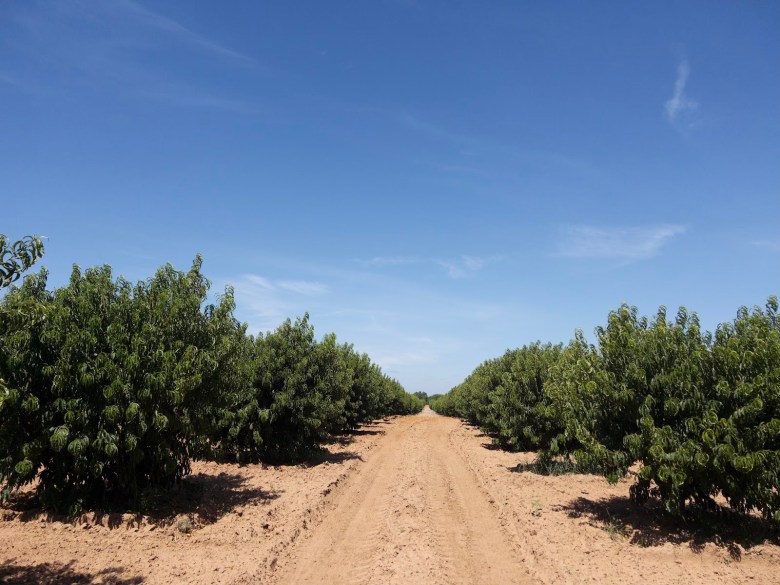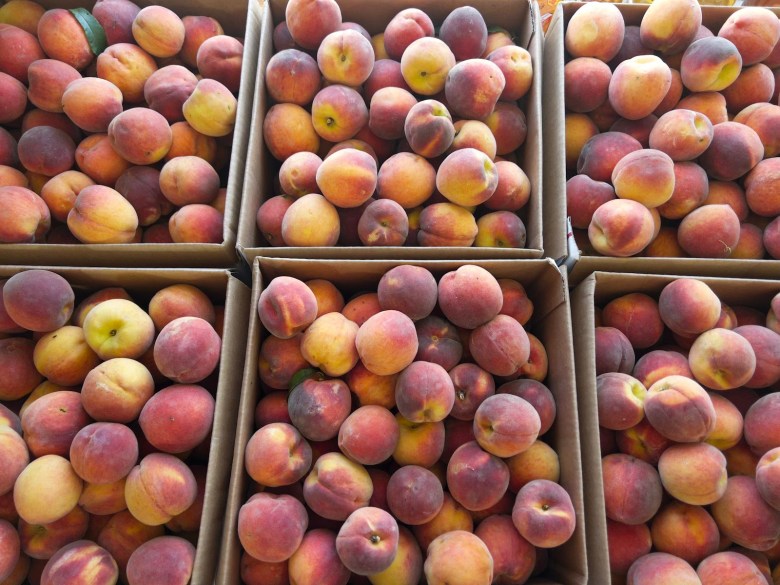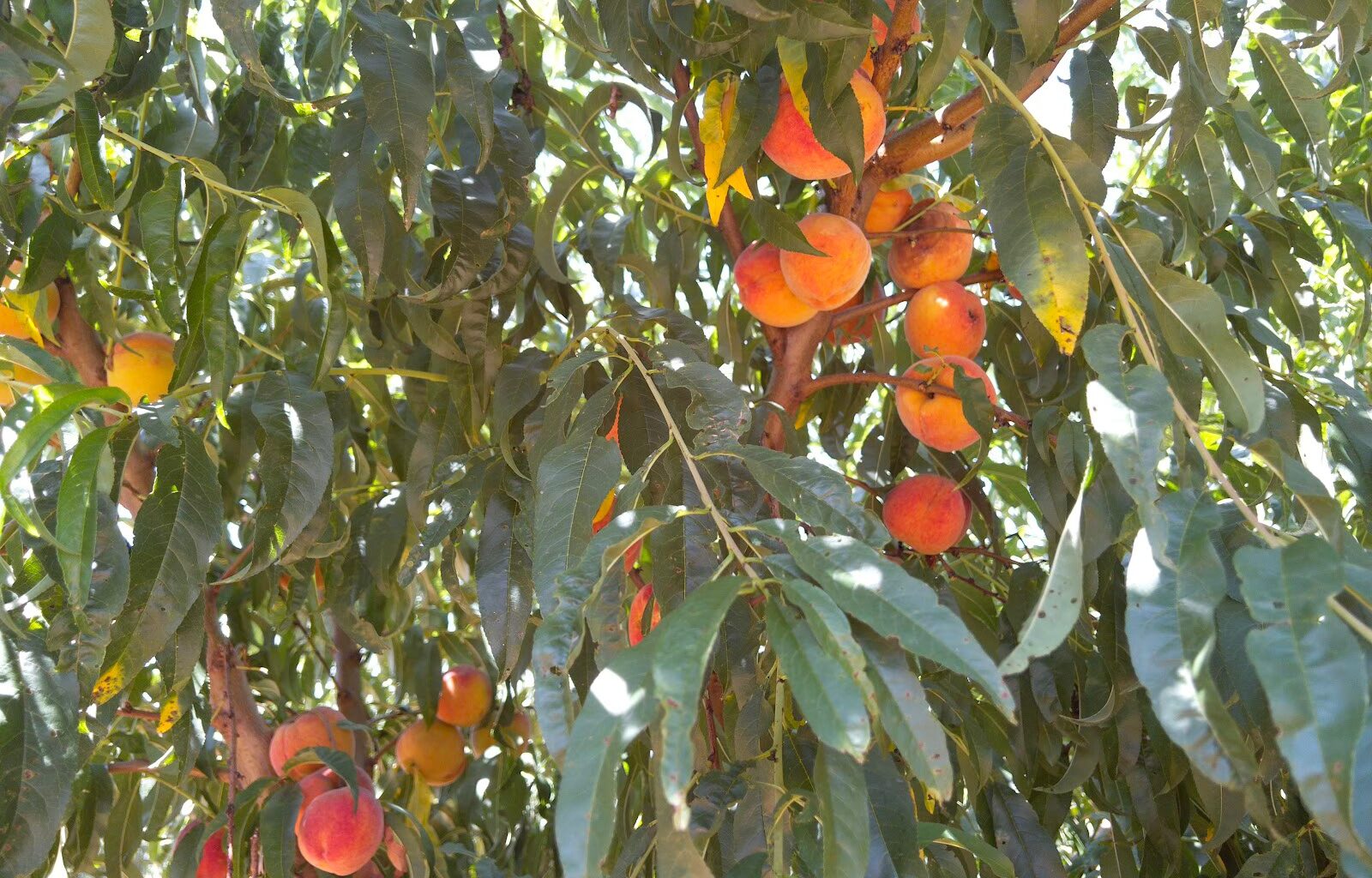Farmer Gary Hutton knows the summer brings the peach pilgrimage.
The owner of Hutton Peach Farm in Weatherford regularly sees customers from Fort Worth and Arlington to San Antonio — and even as far as Alaska. While the farm doesn’t ship its peaches, its customers have been known to do so.
“They’re just looking for the fresh fruit and the experience just to get out of town, a place to go,” Hutton said about his loyal customers.
This summer’s harvest has been scarce for North Texas, said Tim Hartmann, a Texas A&M University fruit crop specialist. While Fort Worth-area farmers face a limited peach harvest, demand remains high for the temperamental fruit.
North Texas is suitable for growing many varieties of peaches as the area’s cooler nights with less rainfall produce larger, sweeter, more colorful peaches.
However, the hardships of freezes and extreme heat often determine the fate of a peach. Hartmann said that an insufficient dormant season this year due to warmer temperatures means growers can only harvest just over half of their crop.
This year’s limited harvest has made it hard for sellers to source locally.
Produce buyer Kyle Sayers, whose family owns and operates a farmers market on East Belknap in Fort Worth, prioritizes selling Parker County peaches as long as farmers are producing.
Texas peaches typically make up about 60% of the market’s peach sales this time of year, with the rest coming from Georgia and California.
However, longtime supplier Cooper Farms, for example, isn’t selling outside its farm this year due to a smaller crop, so the market relies on Hutton for their Texas peaches, Sayers said.
Hutton Peach Farm has been in business since the Huttons took over the orchard from another family in 1980.
Gary Hutton said the family’s interest was inspired in part by growing up with cattle, field crops and a big garden. The farm was also an investment opportunity.
 Rows of peach trees stretch across Hutton Peach Farm. Rain or shine, Hutton recalls customers showing up for their peaches and the farm providing them. (Hannah Dollar | Fort Worth Report)
Rows of peach trees stretch across Hutton Peach Farm. Rain or shine, Hutton recalls customers showing up for their peaches and the farm providing them. (Hannah Dollar | Fort Worth Report)
As a Fort Worth native, Hutton has seen the market shift over time, with local growers and fruit stands moving away from rural farmland and toward the city.
“Any of the fruit stands that you drive to now, we’re all scattered out. We’re not next door to each other,” Hutton said.
However, he now sees development pulling people back to rural areas, but without the desire to farm.
Despite challenges, North Texas growers say they keep planting and picking, peach by peach, so customers can savor the unmatched flavor of a Texas peach, ripe and close to home.
A career pivot and a gamble
 Bushels of freestone peaches of the July Prince variety sit ready for purchase at the Hutton Peach Farm store. (Hannah Dollar | Fort Worth Report)
Bushels of freestone peaches of the July Prince variety sit ready for purchase at the Hutton Peach Farm store. (Hannah Dollar | Fort Worth Report)
Every Saturday, Mary Alice Sattler greets loyal customers at the Denton farmers market, one of nine markets her family’s orchard distributes fruit to regularly. Her family’s passion for providing fresh fruit to local communities is rewarded with excited commentary from customers, she said.
We’ve been waiting for you all year.
We love this fruit.
This is the best peach ever.
“When you grow fruit locally and make it accessible to your communities, people are really excited about that,” said Sattler, whose parents own Winona Orchards in East Texas.
However, the unique demand for Texas peaches is sometimes met with the reality of supply discrepancies, Sattler said.
“While the supply can wax and wane, the demand is always there,” she said.
Some growers have roots in gardening or family farms, while others dug in without knowing they were gambling on a temperamental crop.
In 2007, Sattler’s father, with no background in gardening or farming, planted the orchard, starting with 3,500 trees. Today their orchard shades nearly 50 acres with additional acres of berries adjacent.
“Peaches are one of the most delicate and needy crops to grow. They are not simple to grow. It is wild that so many people are just like, ‘Yeah, let’s do it. Let’s give it a go,” Sattler said.
From hobby to blossoming business
Peach farming started as a hobby for Jim Herbison, owner of Gemini Peach & Rose Farm in Denton.
He retired from a career in chemical engineering and in 2008 bought land to grow roses, a passion that has won him awards for his gardens and hybridizations of the flower, he said.
He transitioned to peaches after finding himself with more acreage than his rose bushes could fill.
His initial 40 trees blossomed to more than 200 trees over the years, he said.
“Growing peaches isn’t that easy,” Herbison, 82, said. Growers battle the weather, insects, birds and squirrels. “I thought when I selected peaches along with roses that it would be sort of a side thought, and I wouldn’t have to do very much. But I found out otherwise very quickly.”
Now, he runs a pick-your-own-fruit operation and has “more customers than peaches,” he said.
Herbison often sees a line of cars waiting to pick peaches on a Saturday.
He finds joy in his relationships with his customers, offering advice on roses and peaches, and catering to families by providing picnic tables and a swing under a 250-year-old American elm tree.
“I’m successful because I try to meet people where they are,” Herbison said.
Along with most large-scale growers near Parker County, which holds an annual peach festival that draws thousands, Herbison sees his farm as a commodity for his local customers.
Texas is still a net importer of peaches as the state produces less fruit than is consumed, indicating a strong demand that local growers cannot fully meet.
Larger sellers, such as Central Market, also prioritize local produce as “some folks only want Texas fruit,” said Nichelle Sullivan, Central Market public affairs manager. The grocery store chain uses a network of growers from across Texas throughout the season.
However, local growers who usually deliver directly to the Fort Worth store cannot due to this year’s limited season, so the store gets fruit from Camp County and Lubbock County, Sullivan said.
The Texas peach industry has an advantage: it markets itself as a local and regional product, Hartmann said.
“It doesn’t have to go very far or sit very long, and that means you can pick it when it’s pretty ripe,” Hartmann said. “Those fruits are going to have the best flavor because it’s going to be the closest thing to picking a ripe, soft peach right off the tree.”
That’s not always the case for many grocery stores, Sattler said.
“The one thing that ruins a peach faster than anything else is when it’s stuck on a truck for two weeks,” Sattler said. “When you’re getting a grocery store peach and it tastes like cardboard, there’s a reason for that.”
What are growers’ favorite ways to eat a peach?
Winona Orchards market manager Mary Alice Sattler’s favorite way to eat a peach is ripe and over the sink or in one of her homemade peach tarts.
Jim Herbison, owner of Gemini Peach & Rose Farm, loves his homemade peach ice cream. “I’m not a chef, but I can mix things pretty good. I haven’t found anyone yet that said they didn’t like my ice cream.”
Gary Hutton, owner of Hutton Peach Farm: “Eating a really fresh peach right off the tree. I take some home and put them on the kitchen counter and let them ripen. I’ll go wash one off and just eat it over the sink.”
Hannah Dollar is an audience engagement fellow for the Fort Worth Report. Contact her at hannah.dollar@fortworthreport.org.
At the Fort Worth Report, news decisions are made independently of our board members and financial supporters. Read more about our editorial independence policy here.
Related
Fort Worth Report is certified by the Journalism Trust Initiative for adhering to standards for ethical journalism.
Republish This Story
Republishing is free for noncommercial entities. Commercial entities are prohibited without a licensing agreement. Contact us for details.
